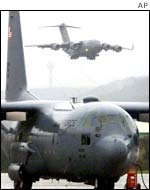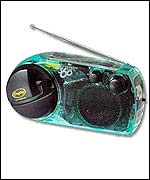It started as a few cogs
and springs in the hands of an eccentric inventor. But now the wind-up
radio is a secret weapon in America's battle for the Afghan airwaves, writes
BBC News Online's Jonathan Duffy.
It's a battle for the air
and the airwaves
As well as dropping bombs
and food ration packs into Afghanistan, military strategists in Washington
have a new secret weapon in their war on terrorism: the wind-up radio.
The Americans have reportedly
been air-dropping hundreds of small wind-up radios into Afghanistan as
the first step in what promises to be a battle for the hearts and minds
of the Afghan people.
The radios are thought to
be specially commissioned fixed-frequency models that will automatically
tune into information broadcasts issued by the US military.
Washington is relying on
the work of its renowned Commando Solo unit to reach Afghans over the airwaves,
and maybe also to block out rival broadcasts by the Taleban, according
to an expert.
The six EC-130 planes that
make up the Air National Guard's Commando Solo fleet serve as flying radio
stations. The unit has a record of operating in US conflicts such as those
in Panama, Bosnia and Haiti.
As well as efforts by the
US military to air-drop radios, relief agencies are also working to supply
commercial wind-up models to refugees, many of whom have fled their homes
because of severe food shortages in Afghanistan.
Freeplay, the company which
pioneered wind-up radio technology through British inventor Trevor Baylis,
says it has recently had orders for "tens of thousands" of radios for the
region.
But unlike those dropped
by the Americans, these will not be locked on to a single frequency and
so will be able to pick up broadcasts from independent media such as BBC's
World Service and Voice of America.
Television ban
The whole thing has Mr Baylis,
who struggled for years to get backing for his invention, quite overawed.
"To think when I was sitting
there with a load of springs and cogs and wires that one day this technology
would be used by the American military to help fight their wars is quite
astonishing," he says.
"What a compliment. But now
the genie is out of the bottle, I only hope it is not used for evil."
Radio is seen as a key weapon
in the current conflict, since it is one of the few forms of media available
to Afghans. The ruling Taleban forbid television, and with high levels
of illiteracy, newspapers command only a select audience. |

